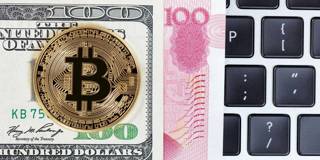Cryptocurrencies promise to realize Friedrich Hayek’s dream of a free market in money. But human societies have discovered no better way to keep the value of money roughly constant than by relying on central banks to exercise control over its issue.
LONDON – Slumps have always been boom times for monetary experiments, and the economic collapse of 2008-2009 was no different. Underlying this recurrence is the instinctive feeling that economic calamities must have monetary causes, and therefore monetary remedies. There is either too much money, which causes inflation, or too little, which leads to depression. So the aim of monetary reformers –among whom are always a large number of quacks and cranks – has been to “keep money in order” and prevent its gyrations from disturbing the “real” economy of production and trade.
A further motive for monetary reform has been to head off more drastic surgery to the established order. If monetary fluctuations are the main cause of economic fluctuations, and if one can ensure the right quantity of money to support normal business activity, there will be no need for government interference. This has been the main teaching of economists wedded to free markets.
Few remember that quantitative easing (QE) marked the start of US President Franklin D. Roosevelt’s New Deal. With the US on the gold standard, the Treasury purchased gold to lift its price and thus augment the buying power of heavily indebted farmers. FDR’s gold-buying spree, described at the time by John Maynard Keynes as “the gold standard on the booze,” has been generally dismissed as ineffective. But, to counter the collapse of 2008, the monetarist chairman of the US Federal Reserve, Ben Bernanke, and other central bankers revived it in the form of massive purchases of government securities. “Unconventional monetary policy” – Keynes surely would have called it “central banking on the booze” – was the default recovery mechanism. Although most of the new money was hoarded or used for speculation, QE succeeded in fending off the call for expansionary fiscal policy.

LONDON – Slumps have always been boom times for monetary experiments, and the economic collapse of 2008-2009 was no different. Underlying this recurrence is the instinctive feeling that economic calamities must have monetary causes, and therefore monetary remedies. There is either too much money, which causes inflation, or too little, which leads to depression. So the aim of monetary reformers –among whom are always a large number of quacks and cranks – has been to “keep money in order” and prevent its gyrations from disturbing the “real” economy of production and trade.
A further motive for monetary reform has been to head off more drastic surgery to the established order. If monetary fluctuations are the main cause of economic fluctuations, and if one can ensure the right quantity of money to support normal business activity, there will be no need for government interference. This has been the main teaching of economists wedded to free markets.
Few remember that quantitative easing (QE) marked the start of US President Franklin D. Roosevelt’s New Deal. With the US on the gold standard, the Treasury purchased gold to lift its price and thus augment the buying power of heavily indebted farmers. FDR’s gold-buying spree, described at the time by John Maynard Keynes as “the gold standard on the booze,” has been generally dismissed as ineffective. But, to counter the collapse of 2008, the monetarist chairman of the US Federal Reserve, Ben Bernanke, and other central bankers revived it in the form of massive purchases of government securities. “Unconventional monetary policy” – Keynes surely would have called it “central banking on the booze” – was the default recovery mechanism. Although most of the new money was hoarded or used for speculation, QE succeeded in fending off the call for expansionary fiscal policy.